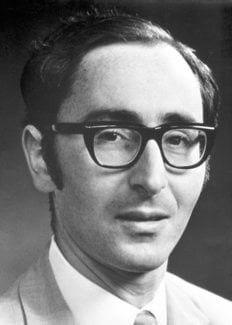Brian D. Josephson
Biographical

| Date of birth: 4 January 1940
|
|
| Place of birth: Cardiff, Wales, U.K.
|
|
|
|
|
| Education | |
| Cardiff High School
|
|
| University of Cambridge, B.A. |
1960
|
| University of Cambridge, M.A., Ph.D |
1964
|
|
|
|
| Academic Career |
|
| Fellow of Trinity College, Cambridge |
1962
|
| Research Assistant Professor, University of Illinois |
1964-65
|
| Assistant Director of Research, University of Cambridge |
1967-72
|
| NSF Senior Foreign Scientist Fellow, Cornell University |
1971
|
| Reader in Physics, University of Cambridge |
1972-74
|
| Professor of Physics, University of Cambridge |
1974-
|
| Visiting Professor – Computer Science Department, Wayne State University, Detroit |
1983
|
| Visiting Professor, Indian Institute of Science, Bangalore |
1984
|
| Visiting Professor, University of Missouri-Rolla |
1987
|
|
|
|
| Awards |
|
| New Scientist |
1969
|
| Research Corporation |
1969
|
| Fritz London |
1970
|
|
|
|
| Medals |
|
| Guthrie (Institute of Physics) 1972 |
1972
|
| van der Pol 1972 |
1972
|
| Elliott Cresson (Franklin Institute) 1972 |
1972
|
| Hughes (Royal Society) 1972 |
1972
|
| Holweck (Institute of Physics and French Institute of Physics) 1972 |
1972
|
| Faraday (Institution of Electrical Engineers) 1982 |
1982
|
| Sir George Thomson (Institute of Measurement and Control) 1984 |
1984
|
|
|
|
| Other Information |
|
| Fellow of the Institute of Physics |
|
| Honorary D.Sc., University of Wales 1974 |
1974
|
| Honorary Member, American Academy of Arts and Sciences 1974 |
1974
|
| Honorary Member, Institute of Electrical and Electronic Engineers 1982 |
1982
|
| Honorary D.Sc., University of Exeter 1983 |
1983
|
| Invited presentation on subject of ‘Higher States of Consciousness’, to US Congressional Committee 1983 |
1983
|
This autobiography/biography was written at the time of the award and first published in the book series Les Prix Nobel. It was later edited and republished in Nobel Lectures. To cite this document, always state the source as shown above.
Nobel Prizes and laureates
Six prizes were awarded for achievements that have conferred the greatest benefit to humankind. The 14 laureates' work and discoveries range from quantum tunnelling to promoting democratic rights.
See them all presented here.
Explore prizes and laureates
Look for popular awards and laureates in different fields, and discover the history of the Nobel Prize.
